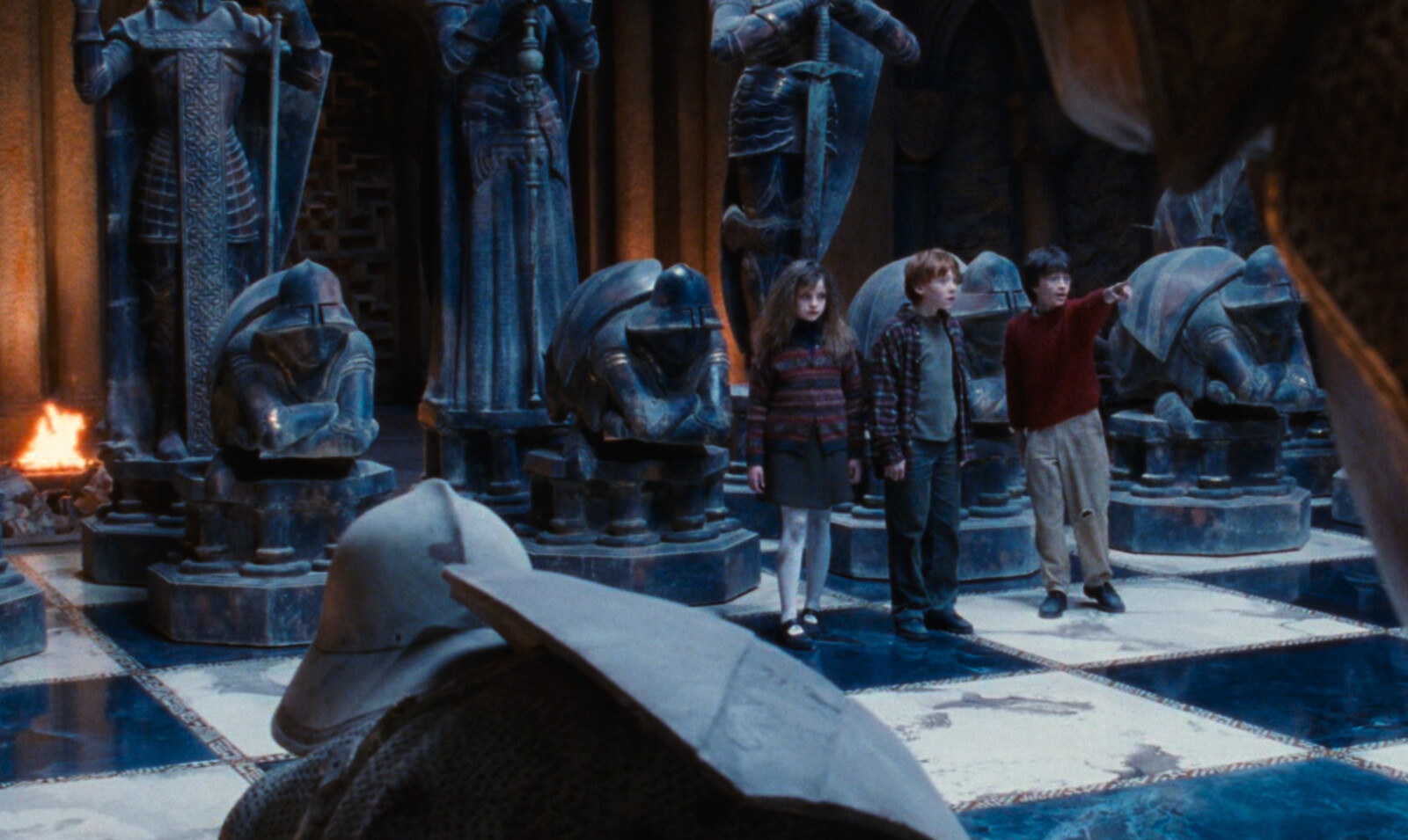Harry Potter's Chess Puzzle Makes No Darn Sense

We know it's become cool to bag on Harry Potter lately, but we promise you, we've been doing it for decades. All this recent talk just gives us an excuse to air ancient grievances anew, about a book series that it briefly seemed everyone had moved on from.
Take the silly ending to the first book. Dumbledore hides away a magic stone deep in Hogwarts, putting it behind a series of challenges, one challenge created by each teacher. A series of challenges provides more protection than just sticking the stone out in the open, sure. But the thing about challenges is they're specifically designed to be beaten. Beaten with difficulty, but still beaten.
For example, Harry and the gang come upon a locked door, one that cannot be unlocked magically. To open it, they must catch the key, which is flying through the air among a swarm of other keys. That's quite hard—you'd have to be skilled at flying to catch the key. But you know what would be harder? If the key just wasn't in the room at all, in which case even an expert seeker would be unable to get through the door.
Don't Miss
Or, they come upon a challenge set up by Snape, a series of potions with a cryptic poem explaining which one you must drink. The poem's tricky (though not too tricky; you reading the book as a child are supposed to have a shot and solving it before Hermione does). But he could also have just left the potions totally unlabeled and given no hints about which one to drink. Logic clues may thwart most wizards, but the absence of clues would thwart everyone. So why test someone's skill at logic puzzles? If the thief happens to be skilled with them, that doesn't give them any more right to steal the stone.
Dumbest is the Chessboard Chamber, in which the kids must win a game of chess against some bots. It's nonsensical the same way the other tests are—again, why grant entrance to a thief with this particular skill, why not just enchant the door to stay closed to everyone but Dumbledore, you have the technology. But this test is extra ridiculous because the story tries to make it the most dramatic. To solve the puzzle, Ron must sacrifice himself. Oh no!
Except, he doesn't die, he just gets put out of commission briefly, sparing him the rest of the chambers' dangers. I'm not saying he should have died, just that making it appear so then taking it back is pointless. Some readers even speculated that this scene foreshadowed some later time when Ron would sacrifice himself for real ("there had to be some point to this"), but that never happened.

Warner Bros.
Now, we know the narrative purpose behind these silly challenges. Each friend gets a chance to show off their special talent, revealing their importance and the importance of all they learned this year. But framing it as this artificial final exam designed by actual teachers directly calling upon these skills make the skills seem less useful, not more.
It's like that joke where a kid asks their parents, "When will I ever need geometry anyway," and the parents can only say, "What if an alien comes down and says you have to solve this geometry problem, or they'll blow up the Earth." The parents are unintentionally (and inaccurately) admitting that geometry doesn't have any use outside of tests. Though, that absurd example still makes more sense than Harry Potter because at least the aliens want you to solve their geometry problem, for their own mysterious reason. The Hogwarts teachers want no one to get past their obstacle course yet set it up so some can.
You can write the same kind of final exam ending without that contradiction. The "tests" just have to come up in the environment instead of being manufactured by characters—which is still contrived, but it doesn't aggressively violate sense. Tons of stories manage this. Like Pixar's Onward, where the characters learn a bunch of seemingly throwaway spells during their adventure then use them all in succession when fighting a dragon at the end.
The first Harry Potter book could have done something similar. Harry would use a broom to cross some chasm that was supposed to be uncrossable, Hermione could logic her way around some obstacle you're not supposed to get through without the key, Ron could defeat a Dementor by virtue of not having a soul, etc.
Of course, fans are always around to explain and defend existing choices. Dumbledore did want someone to get through the obstacle course, says one fan theory—in fact, he specifically wanted Harry to get through it. And Ron's chess game did foreshadow something, says another theory—it foreshadows the kids later chipping away at the pieces of Voldemort. Like all good fan theories, these don't stand up to scrutiny but still improve the story, so you're welcome to believe them both.
Follow Ryan Menezes on Twitter for more stuff no one should see.
Top image: Warner Bros.
